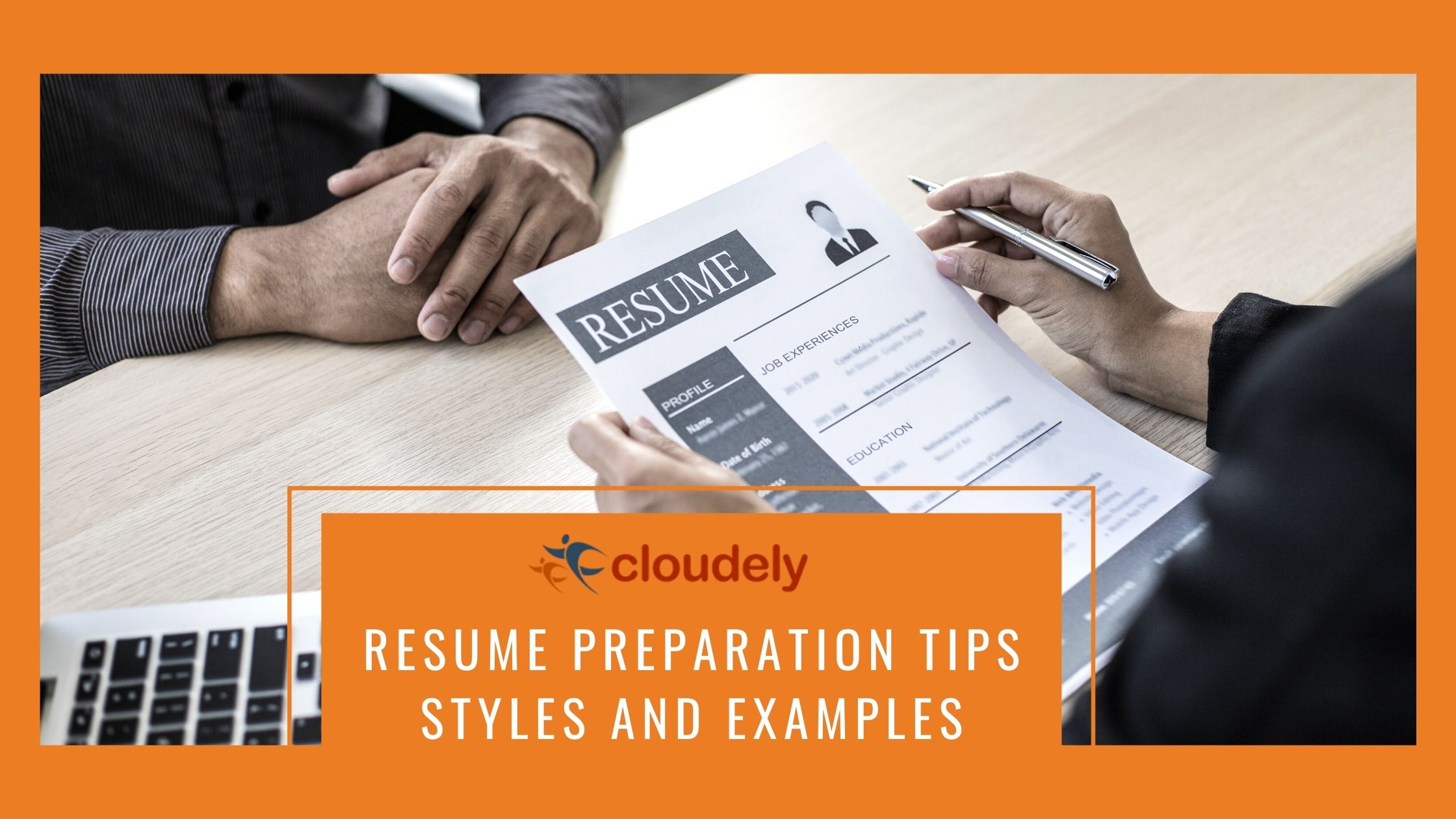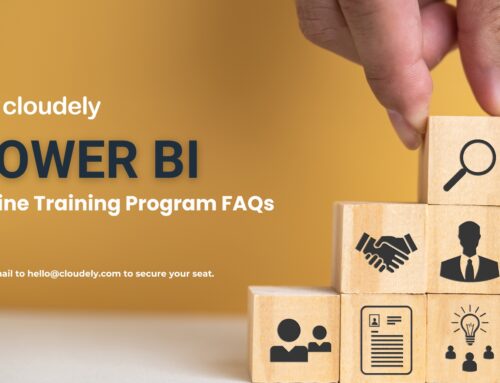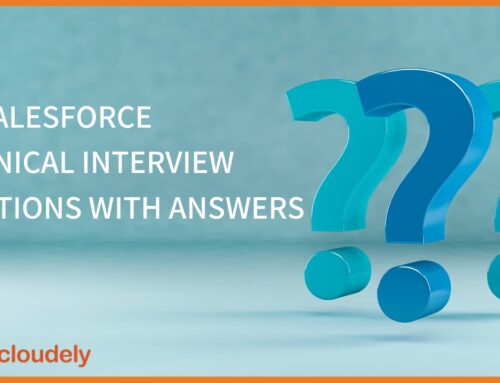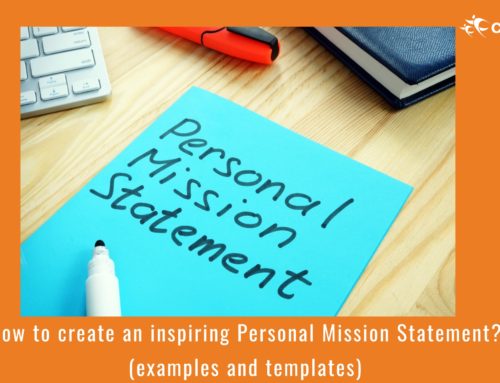Recruiters, on average, spend 6 seconds to scan a resume. Yes, you read it right! These 6 seconds will determine the odds of success of a job application.
On average, a corporate job post pulls as many as 250 applicants. If your intent to push your resume from “All Applicants” to the pile of “Candidate Under Consideration” is strong, a knowledge of resume preparation tips is imperative.
Table of Contents
How to write a resume?
Resume preparation is an art. Fortunately, it does not have a secret recipe. It varies with individual needs, which depends on factors such as:
- Experience
- Skillset
- Career gap
- Transition into entirely a new career path
- Role applying
There is nothing like one size fits all in resume preparation. The approach to writing a resume should take into account all these aspects.
Resume preparation styles
Resume preparation experts believe in three broad models of resumes –Chronological, Functional, and Combinational.
Chronological style resume
This resume preparation style suits well for those professionals with no career gaps. Highlighting achievements of the professional journey is easier with the chronological type of resume. If you have been climbing the career ladder, this style is your best bet.
There are two types in the chronological style of resume preparation:
- Chronology: In this style, you mention the earliest role at the top and list the recent employer at last.
- Reverse Chronology: In this, you list the most recent job at the top and start mentioning your previous employers later.
Tip:
Most recruiters want to know your latest role and skill set to estimate your fitness for the current opening. So, choosing reverse chronology is always a wise idea.
Functional style resume
Opt for this style if you have a stunning skill set and notable years of experience. A plus point with this resume preparation style is it lets you highlight the experience and hide career gaps.
Tip:
If you are moving into an entirely diverse field, this style of resume preparation is for you. Freshers, please stay away from this model.
Combinational style
This resume preparation model gives equal importance to both the qualifications as well as professional experience. It fits those eminent in their industries with proven experience.
Tip:
Refrain from using this style if you are fresher or do not have mentionable experience.
Now that you have an idea about choosing a resume style that fits your experience and career profile, let’s understand the dos and don’ts of resume preparation.
Dos and don’ts of resume preparation: Why should you care?
A resume is more than just your educational and professional biography. Given that recruiters have limited time for screening resumes, knowledge of dos and don’ts of resume writing is crucial.
Besides, the trends are changing. Most companies opt for an Application Tracking System (ATS) to filter the volume of applications they receive.
So, gaining an idea about making an impression on human HRs and ATS can benefit any candidate.
Resume preparation tips for freshers and experienced
Here are resume preparation tips for freshers and experienced that would benefit you when working on respective resume sections.
Career Objective – Is it still needed?
An oft-debated concept about a resume, the inclusion of career objectives is a personal choice.
But what are resume experts saying about career objectives? Just remove it. Why?
A career objective basically implies nothing. It is an outdated part of your resume that resonates nothing with the company’s needs.
If you cannot imagine a resume without a career objective, do this:
Tip:
Frame an Experience Summary or Summary statement. Here, you should focus on your professional experience and various skills rather than adding adjectives that describe your qualities. Summarize your years of experience and bundles of skill sets in 2-3 sentences quickly.
Working on Experience Section
This is a diversified area that can reveal a lot about your profession and career. Understandably, the experience section varies for every case.
Begin with the recent job and explain your strengths. Tailor your experience to fit the needs of the job you are currently applying for.
Make the recruiter’s life easy by highlighting the specific skill set they are currently in search of.
Explain clearly your roles in every company that you worked to date highlighting the professional experience and skill set.
If your employer is well renowned like Facebook or Google, you do not need to detail much about the organization. Else, adding a crisp description of the company will make it clear for the recruiter to understand where you hail.
Bold and highlight your company names and the tenure in the right.
Do not over-italicize or bold and underline at every step. Save emphasis for only important points that need the recruiter’s attention.
Remember relevance is the key
This is one of the important resume preparation tips for experienced. During the resume preparation, take into account the ATS.
Application tracking systems filter candidates based on the matching score which depends on contextual keywords, and relevance analysis.
Adding the keywords that the job description mentions can add more weight to your resume from the viewpoint of ATS.
That said, do not copy the wordings as they are from the job description. Instead, give relevant real-time examples where you implemented the skill set. Tweak it into your career experience. and mention how it added value to your employer.
For instance, if the job description mentions “ability to handle pressure”, don’t be tempted to add it in your skills or strengths section straightaway.
Instead, you must say: “Handled a team of 12 members and successfully delivered results within timelines” in your professional experience section.
Talk with figures
Be precise in your narration. Instead of mentioning “A key team player in a sales team that contributed to the organizational growth”, say, “Achieved 110% growth in sales compared to the previous year”. Let the figures speak for your achievements”.
If the job description says, “ability to manage a team”, and you already possess that experience, mention clearly the size of the team you managed earlier.
Handling a team of 6 people is a different experience from one with 45 members. So, be transparent and provide figures wherever applicable.
Needless to say, this is one of the resume preparation tips for experienced to showcase their calibre as proven professionals.
Do not disclose confidential information
Never mention any confidential information about your previous employer. It could be their collaboration with other companies or your tasks with a third party on behalf of your company, etc.,
Refrain from revealing clients’ names, business dealings, and confidential information other than the employer’s name.
Be transparent in career gaps
Handling the career gap is another critical aspect in resume preparation and one of the essential resume preparation tips for experienced.
Be aware that it is of no use in hiding career gaps or masking the gaps with lies. Companies do have their style of verifying the candidate details through a background check. The more you try to hide, the greater the negative impact on you.
Be transparent and honest. Speak about why and what caused the career gap. Remember to explain how you dealt with it positively.
Add any professional courses or certifications you did in the meantime to upskill.
Volunteering and non-profit work experience, part-time jobs, freelance works and gigs, side projects, and pro bono works – all can make an entry in the resume to fill the career gap as long as they add value to your skillset.
Related: How to explain career gaps?
Care about the length of the resume
How much length should my resume be? – It is one of the most oft-asked doubts from resume preparation tips for freshers and experienced.
First things first. Let’s agree that we all get tempted to dump in as much as possible to flaunt at the potential employer.
But, now that we know the importance of 6 seconds that can make or break the success of the job hunt, trimming the resume as much as possible makes more sense.
Never go beyond one page for making a resume if you are a fresher. A two-page resume fits experienced professionals with long and notable experience.
Be wise while mentioning accomplishments
Accomplishments can include everything from your promotions or increase in sales to your previous company because of your contributions. You can also add active participation in marathons, trekking, or sports, as they showcase your other side as an enthusiastic individual.
A point to note here:
Winning in your high school volleyball competitions or singing contests might not be appealing to recruiters unless you are applying for a job taking in fresh college pass-outs.
The farther you move away from college and school life, the better you avoid mentioning them in the resume.
Instead, try to showcase your worth by adding professional accomplishments such as certifications, meeting targets, bringing in profits for companies, or appreciation from clients.
Provide contact information
Provide accurate details where the recruiters can reach you. Alternate contact details and your social media (read, professional profiles) will also help.
Add personal websites or portfolios if you have one and the job demands for any.
Check grammar and typos
It may sound too basic, but yes, we want to add this among resume preparation tips for freshers and experienced.
You don’t want to give an amateurish impression to the recruiter by drafting your whole professional experience without doing any spelling and grammar checks.
- Ask your friends and well-wishers to review your resume.
- Take ample time to write, rewrite, and edit the resume before you finally click Send.
- Quadruple check that the content is free from typos, grammatical errors, punctuation mistakes and scores its best on content quality check tools.
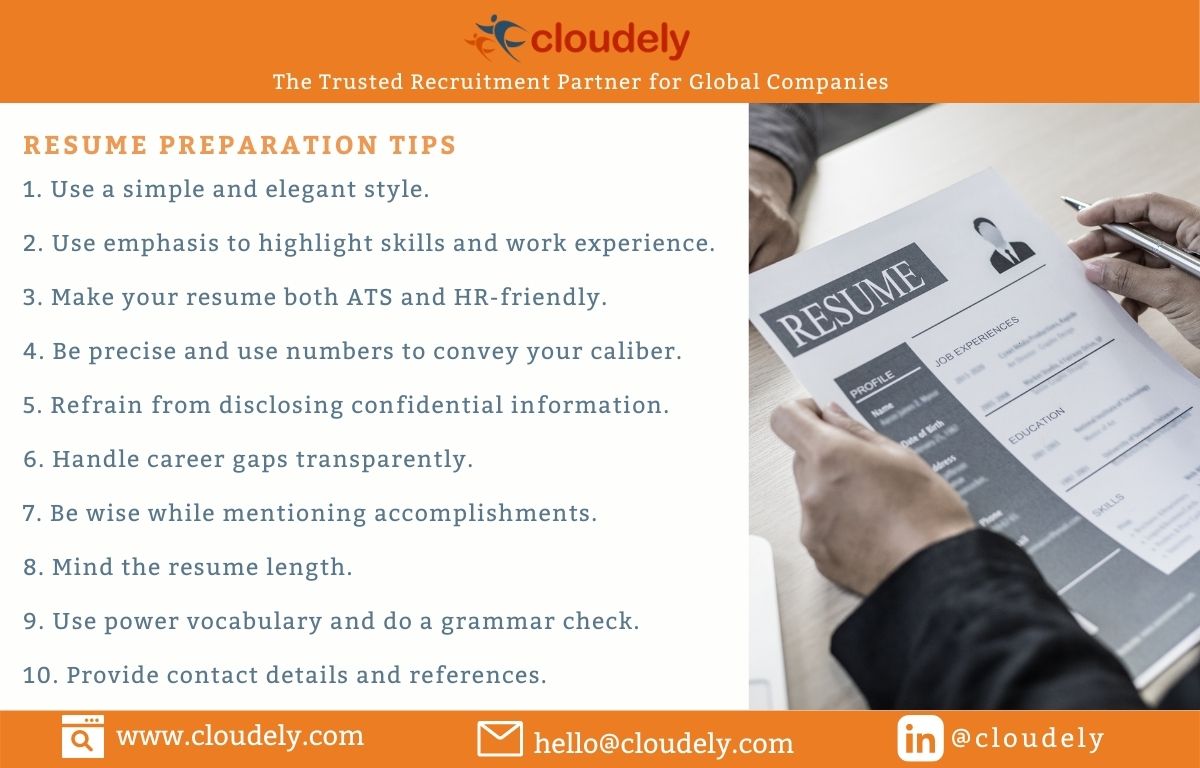
Add power with vocabulary
Consider these two statements from different resumes:
“Led a team of 12 members and delivered results that brought a 34% increase in sales.”
“Yielded a 34% increase in sales by effectively mobilizing a team of 12”
The second one sounds strong. You get it.
When trying your luck at time-strapped recruiters, vocabulary matters to drive the point.
Work on genuinely adding powerful words without appearing too robotic or artificial.
On the other hand, do not go overboard with technical jargon. Most recruiters might not have time to read and decode your technical jargon.
Take care that skills are mentioned aptly for easier understanding. Reserve your technical wordings for the next rounds of the interview.
Opt for a simple and elegant design
Unless you are a graphic designer and need to showcase your designing skills, focus on the content and its arrangement in an appealing way. Flashy bright designs and photographs may look good in most places other than a resume.
- Stick to two fonts and colors at the most.
- Keep your resume professional, simple, and devoid of too bright colors and margins.
- Break up the text into different brief sections.
- Use professional formatting and bullets.
- Do not use more than two sentences under one bullet.
- Resume template designs could be your safest bet. They cut down time in designing too.
Adding personal information and references
Details such as full name, email id, and contact number are essential. Adding your home address will look great.
But providing information such as marital status, the number of children, hobbies, blood group, etc., might sound a little bit too much. You can share them in the consequent face-to-face rounds.
Alongside, provide two professional contact details for references.
Note the qualification and experience
Most companies mention what they are looking for in a potential candidate. Any slightest margin in terms of experience might be acceptable for recruiters.
For instance, if the job says “Need minimum 4 years of experience”, and you have, say 3 years, you can try your luck provided you are capable enough to handle the challenges of a professional with 4 years’ experience.
But if the job description mentions “need a full-time graduate” and you completed graduation through part-time or distance courses, you should think twice before applying. Not all recruiters consider a part-time degree equivalent to a full-time one.
Conclusion
Your success in a job hunt depends on many aspects. And resume preparation is the first step for your success. So be wise and knowledgeable while resume making and enhance your chances of success.
Who are we?
At Cloudely, we believe in empowering candidates with relevant information that helps them land their dream job. Cloudely is an established staffing firm that helped many companies form their full-time, remote, and freelance teams.
Reach us at hello@cloudely.com to avail recruitment solutions that really work for your business. Subscribe to our blog to receive the latest articles in your inbox. Follow us on LinkedIn to stay updated.

